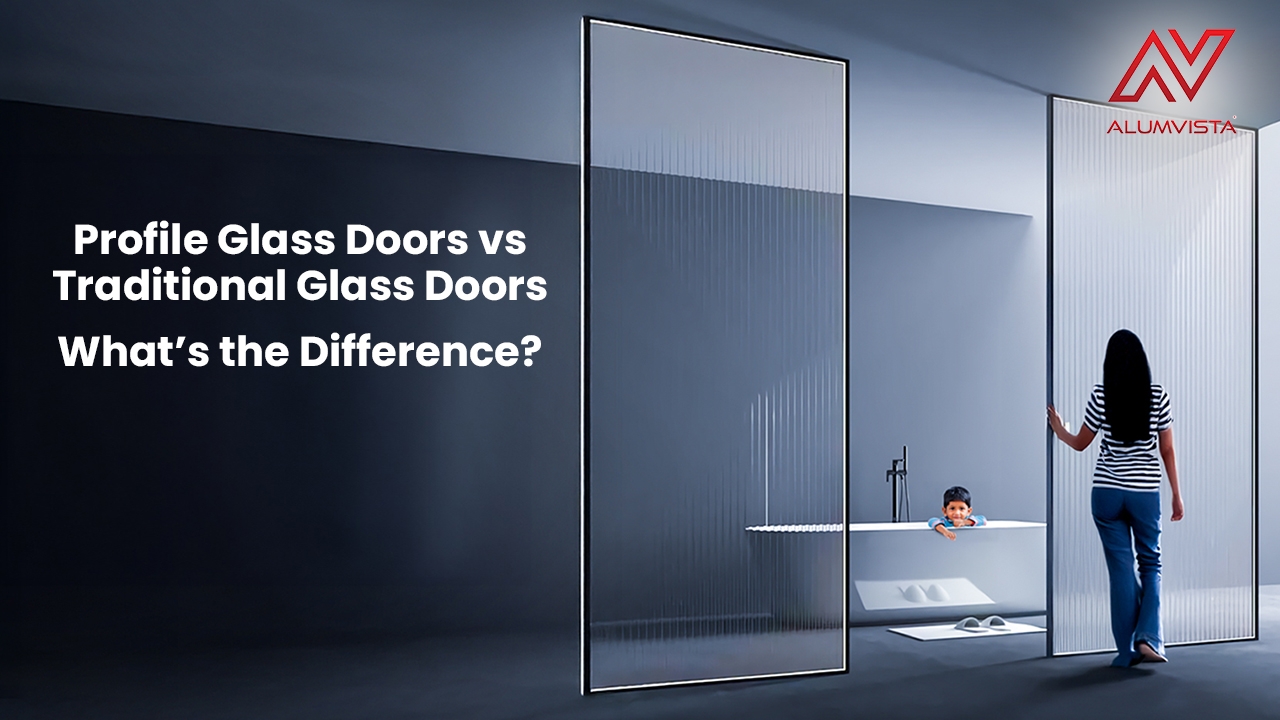Glass doors have always been fancy. They add an open, modern, and fresh touch to a room. But the truth is that not all glass doors are the same. If you plan to upgrade your space, the critical question is not whether to use glass. It’s this: Profile glass doors vs traditional glass doors: What’s the Difference?
You’re in the right place if you’ve been wondering the same. At Alumvista, we help homeowners, designers, and business owners make the smart choice, not just the obvious one. In this article, we’ll walk you through the key differences in design, functionality, and long term value.
What are Traditional and Profile Glass Doors?
Profile Glass doors are framed glass doors and embellished with a thin yet thick border of aluminium or metal profile around the glass panel. These doors have structure, stability, and a clean appearance that allows the glass to be the star. They are modern, they are sleek, and above all, they are functional.
On the other hand, Traditional Glass Doors tend to be full glass slabs, occasionally boasting bulky metal brackets or hinges. These tend to be heavier in design and less versatile in style. They perform the function, but are outdated in meeting design needs.
At Alumvista, we design Profile Glass Doors that integrate style with strength to give your home or office a space-smart edge.
Design Matters: Sleek vs Standard
When you step into a room, what features stand out to you? If it is a profile glass door, you can appreciate its slim frame and minimalist characteristics. These doors have sharp lines and hidden hardware and are proportional to each other. They do not take away from a room; instead, they enhance it.
In contrast, traditional glass doors made of wood tend to appear bulky due to brackets and thick handles placed on them. Traditional doors also do not have profile doors with a smooth, seamless feel.
If your style is modern, clean, and clutter-free, you will most certainly prefer profile glass doors; we at Alumvista have systems tailored for effortless beauty.
Functionality: Smooth as It Gets
You don’t just want your doors to look good; they should work like a charm, too. Profile glass doors come with sliding, folding, or telescopic systems engineered for everyday ease. Whether you want them to glide silently or fold out of the way, these systems are built for performance.
With traditional glass doors, things can get tricky. Hinged systems often need more space to open, can slam shut, and aren’t as flexible for space-saving layouts.
At Alumvista, we design sliding systems that make profile glass doors feel feather-light, with no jerks, no jams, just smooth, silent motion.
Space Usage: Who Wins?
Many homeowners miss something: traditional glass doors need space to swing. If you’re in a compact apartment or a smaller office, that extra space becomes a problem.
Meanwhile, profile glass doors, especially the sliding or folding type, slide into place or fold to one side, giving you more room to breathe, walk, and design freely.
Want to separate your living and dining area without making it feel cramped? Want to divide an office into two work zones without losing natural light? That’s exactly what our Alumvista systems do best.
Durability & Maintenance: Built to Last
Another point where profile glass doors shine is durability. The aluminium profiles offer structural support, reducing stress on the glass and making the entire system more robust.
Traditional glass doors, with no frames or heavy hardware, tend to wear out faster, especially at the hinges. Chips, cracks, and misalignments are not uncommon over time.
With Alumvista’s premium quality aluminium frames and corrosion-resistant finishes, our profile glass doors are made for long-term use with minimal maintenance. Just wipe, slide, and go.
Customisation & Flexibility
Let’s talk options. With profile glass doors, you’re not stuck with just one look. You can choose from various frame thicknesses, finishes, glass types (frosted, clear, tinted), and even opening styles (sliding, folding, telescopic, etc.).
Traditional glass doors? They’re often more rigid in style. What you see is mostly what you get.
At Alumvista, we believe in choice. Our profile glass doors come in multiple formats, from invisible sliding doors to folding partitions designed to match your style and space.
Privacy & Sound Control
Don’t overlook this part, especially if you plan for a home office or a private meeting room. Profile glass doors provide better acoustic insulation, thanks to the sealing offered by the frames. You can still enjoy transparency while reducing noise between rooms.
Traditional glass doors, being frameless, often leave gaps at the edges. That means less privacy and more sound leakage.
If keeping things quiet and private matters to you, profile glass doors from Alumvista is your ideal pick.
Cost vs Value
Yes, profile glass doors may cost a little more upfront than traditional ones, but what you get in return is worth every rupee. Better functionality, longer life, elegant design, and space efficiency? That’s not just a door upgrade. That’s a value upgrade.
And with Alumvista, you’re not just paying for a product. You’re investing in expert craftsmanship, innovation, and after-sales service that serves.
Conclusion
Now that you understand the difference between profile glass doors and traditional glass doors, style, space, and smart functionality don’t have to be compromised. You deserve doors that do more than divide rooms. They should define how your space feels, flows, and functions.
At Alumvista, we don’t just offer doors; we offer design freedom. Our profile glass doors are crafted precisely, engineered for performance, and tailored to complement your lifestyle or work environment. So, whether you’re reimagining your home or upgrading your office, make the smarter choice.
FAQ’s on Profile Glass Doors vs Traditional Glass Doors
1) How are profile glass doors different from traditional glass doors?
Unlike traditional bulky glass panels, profile glass doors use slim aluminium frames for better aesthetics and strength.
2) Do profile glass doors offer better functionality?
Yes, they provide smoother operation, improved sealing, and a more modern appearance than traditional glass doors.
3) Are profile glass doors more durable than traditional ones?
Definitely. Their reinforced aluminium frame offers higher impact resistance and longevity, making them a smarter long-term choice.

